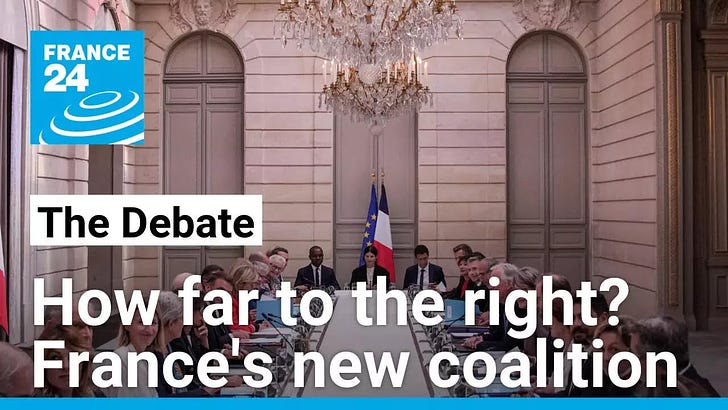European politics is in the middle of a serious surge by the far right.1
French President Emmanuel Macron is one leader who has followed the strategy of pandering to the right. The German political scientist Thomas Bierbacher describes in his book, Mitte/Rechts. Die Internationale Krise des Konservatismus (2023), shows in the cases of Britain, France, and Italy how the conservatives tried to take votes from the far-right by adopting their rhetoric, especially on immigration.
And in all three cases it wound up strengthening the far right. That's how the feckless Tories in Britain would up Brexiting. And in this year's election, they came in third behind Nigel Farage's brand-new nationalist party.
Macron surprised everyone this past summer by dismissing Parliament. There was much speculation that his goal was to set up the NR to be the leading party in forming a government and selecting a new Prime Minister, expecting that the experience would show the voters how bad the Le Pen’s party would be at governing. But the various left parties surprised everyone including themselves by putting together a united “popular front” electoral group that wound up taking first place in the election.
But instead of forming a left-center government, he has set up a government and Prime Minister from the center-right Republican Party (Les Républicains) who will lead a minority government “tolerated” by the far-right RN, i.e., dependent on the RN not to call for a vote of no-confidence.
In other words, Macron decided to keep on with the pander-to-the-far-right strategy. Harrison Stetler writes:
[T]he new government concludes two weeks of coalition negotiations between Macronist MPs and the new prime minister Michel Barnier’s right-wing Les Républicains party. While talks had appeared to break down in recent days over personnel and policy specifics, the need to bind together soon won out.
A Barnier government offers the Républicains a chance to return to power after twelve years on the sidelines, even if he’s dependent on their Macronist ex-adversaries. Once a dominant force in France’s now-defunct two-party system, the conservative Républicains had not been in national government since the end of Nicolas Sarkozy’s presidency in 2012. Since Macron’s election in 2017, they have hemorrhaged supporters and officials to both the president and the far right. Ironically, their return to power comes at a point when the party is a shell of its former self in the National Assembly, with a caucus of merely forty-seven MPs.2 [my emphasis]
Italy, of course, also now has a "post"-fascist Prime Minister from the direct successor party of Mussolini's.
And even though the British election this year produced a majority in Parliament for the Labour Party, that party has become so devoted to neoliberal doctrine that it may go down the same road of trying to pander to the far-right rather than defeat it with sensible, popular left-of-center social and economic policies.3
How far to the right? France's new centre-right coalition. FRANCE 24 English YouTube channel 09/23/2024. (Accessed: 2024-26-09).
Stetler, Harrison (2024): France’s New Government Is a Hard Turn to the Right. Jacobin 09/25/2027. <https://jacobin.com/2024/09/france-michel-barnier-right-republicains> (Accessed: 2024-26-09).
Brown, Gordon (2024): Europe is in thrall to the far right – that’s the result of appeasement by so-called moderates. The Guardian 09/17/2024. <https://www.theguardian.com/commentisfree/2024/sep/17/europe-far-right-appeasement-france-populist-progressive> (Accessed: 2024-04-10). And Gordon Brown is hardly a flaming leftie!


